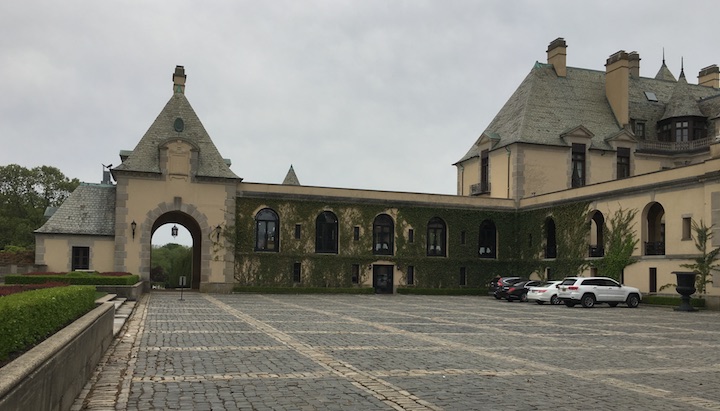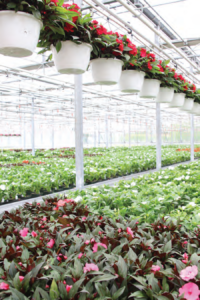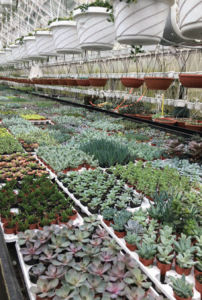
COVER STORY — Rooted in History, Rich in Opportunity
Driving through Long Island, it’s hard not to notice the deep presence of agriculture. From fresh asparagus to extraordinary landscape presentations, the island oozes green. So it’s no surprise there are many greenhouse operations capitalizing on the agricultural environment. The growers that have remained successful through the years have found their place in the market. For Emma’s

Garden, there has been some evolution but the third generation has remained true to the company’s roots while establishing its role and nurturing relationships with New York’s finest.
BEGINNINGS IN A CENTURY-OLD GREENHOUSE
Emma’s Garden was founded in 2008 by brothers Jeff, Eric, Greg and Scott Keil, but that certainly wasn’t the beginning of their venture into the greenhouse business. The company has its foundation in Otto Keil Florists, which was founded by their grandfather and grandmother, Otto and Emma Keil, back in 1941.
The original greenhouses — built in 1917 — in Huntington, New York, which still serve as the main location for Emma’s Garden, were part of a 400-acre estate owned by a wealthy financier Otto Hermann Kahn.
“They were the greenhouses for the castle that sits up on the hill here,” Jeff explains.
When the stock market took a hit in the 1920s, the Gold Coast of Long Island collapsed and most of the large estates were broken up and turned into smaller lots and homes, says Jeff. While there’s very little of that character left on Long Island, the castle up on the hill above Emma’s Garden still remains.


The collapse, however, served as an opportunity for Otto and Emma, and they were able to purchase 6 acres. This included the greenhouses and even a home right on the property where they lived and raised their family.
“My grandparents rented the greenhouses at first,” shares Jeff Keil. During that time, Otto and Emma saved what they could to later invest in the business. They started growing cut flowers and eventually got into annuals. Their main customers at the time were flower shops and estates.
In 1960, Otto and Emma’s son, Otto Jr., took over the business, says Eric Keil. And in 1970 their other son, Norman, joined him. At that point, they began expanding the operation and building greenhouses at remote sites. They also expanded their production to include holiday plants, such as Easter lilies and poinsettias.
It was then that the Keils really established their customer base, servicing independent garden centers, estates, country clubs and golf courses.

From a young age, the four brothers were very involved in the business. After all, the greenhouses were in “grandma’s backyard.” In fact, you can see Scott, Jeff, Greg and Eric posing in what was their grandparents’ backyard in the cover photo.
EMMA’S GARDEN PARTNERS WITH OTTO KEIL FLORISTS
In 2008, the four Keil brothers established what is now Emma’s Garden — a sister company to the current Otto Keil Florists, which is still operated by Otto Jr. Today, the two companies work hand in hand.
“Otto Keil is the wholesale and pickup location, and Emma’s Garden is delivery sales and most of the growing,” explains Jeff. “It just made sense to partition things. It’s more of an organizational thing and also about succession planning.”

succulents and tropicals.
While the Huntington facility is handled through Otto Keil Florists, Emma’s Garden operates three locations on Long Island, shares Eric. They are in Melville, Mattituck and Cutchogue.
Emma’s Garden services “landscapers, garden centers, florists and municipalities with annuals perennials, holiday plants, tropical, evergreens, groundcovers and more,” says Eric.
A UNIQUE BUSINESS MODEL
Emma’s Garden has quite an eclectic customer base, and Jeff credits those customers for shaping the company’s current business model. “Our biggest asset is the fact that we have so much contact with our customers,” Jeff says.
Being located in such close proximity to New York City has its advantages, and the unique customer base is one of them.
“What’s nice is Manhattan has a lot of unique spaces,” says Jeff. “Manhattan and Brooklyn are both experiencing a lot of growth, and there are a lot of parks, and building improvement districts.”
From independent garden centers to landscapers to municipalities, the customers expect one thing from Emma’s Garden: fresh and innovative products.
“One thing that garden centers need is things that don’t look like something they found at a chain,” says Jeff. “It’s a very eccentric crowd, a very artsy group.”
“We try to create some kind of difference between what we’re selling and what the chain stores are selling,” he says. “Because the last thing a customer wants to hear is, ‘I could have done that myself’ or ‘I could have bought that plant at a chain.’”
In order to keep up with the customer demand, Emma’s Garden not only grows unique products but also buys in products from other regions of the country and Canada. As the company’s business model is committed to servicing independents, that means “selling one-, two-, three-, four-cart orders,” says Jeff.
While this business model can be limiting at times, he says it’s a very healthy model for them right now. And their customers appreciate their ability to source products they would otherwise not be able to order because of the smaller quantities.
Between the two companies — Otto Keil Florists and Emma’s Garden — Eric says they source tropicals from Florida, California and Georgia; evergreens and nursery stock from suppliers around the United States and Canada; and other flowering plants from regional suppliers and Canada.
“We rewholesale a good amount of product,” says Jeff. “It probably represents 25 to 30 percent of our gross.”
Another unique aspect of their business is that customers have the option to pick up product directly from their Huntington location. While Emma’s Garden does offer delivery within a 120-mile radius through its fleet of trucks, about a third of their business is done via customer pickup.
Jeff jokes that he sometimes wishes the property was bigger to accommodate the chaos during customer pickup. “Grandma and grandpa should have gotten more than 6 acres.”
CAPITALIZING ON CONSUMER TRENDS
Another advantage to the company’s location is being located just outside a major urban center.
“There’s very few companies our size that serve just independents,” says Jeff. “And I think it only works outside a major urban center. You need to have so many decent-sized customers.”
That being said, being an urban supplier allows them to keep a close eye on the market and trends at the consumer level. “Because we buy a lot, we see a lot,” he adds.
Certain crop categories just aren’t selling at the same level as they were 10 or 20 years ago. One example is holiday plants, which happens to be a fairly large category for Emma’s Garden.
“The unfortunate thing with holiday crops is that the younger generation is not interested. They’re not buying poinsettias and Easter lilies,” says Jeff. “It’s happening rapidly; people are aging and not buying plants anymore.”
However, with this drastic change comes tremendous opportunity. So what is taking the place of holiday plants? Houseplants, says Jeff. “We’ve seen a dramatic surge in houseplant demand.”
The conundrum with houseplants, though, is that many of the growers that offer them are aging out just as the demand is starting to peak, Jeff explains. Emma’s Garden has been sourcing houseplants from Florida. “But the demand is so strong,” he adds, “and the supply is not going to keep up with it.
Other than houseplants, the Keil brothers are constantly on the hunt for new and unique products. “I love senecio ‘Angel Wings’,” shares Jeff. “That’s going to be an up and comer.”
They also travel outside of the country to find the next big thing. “My brother Greg and I go to Germany for the Essen show, and if we see something we feel would fit our customers, we bring it in.”
TEAMWORK DEFINES THE PHILOSOPHY
The Keil family certainly hasn’t reached success easily or alone. Emma’s Garden has about 80 full-time employees — and Jeff, Eric, Greg and Scott are four of them.
Most of the company’s workforce is from Central America, Jeff says. “They’re great people. Most of them grew up on farms, and they come here with a work ethic.”
He says they are blessed with an incredible workforce that works until 10 or 11 p.m. during peak season and will come back the next morning at 6 a.m. “There aren’t many people you can ask to do that.”
Just because Jeff, Eric, Scott and Greg are owners does not mean they don’t get their hands dirty along with the rest of the employees. Jeff manages production, Greg runs pickup sales. Scott handles shipping, and Eric manages the remote facilities.
“My business philosophy is I don’t believe any man gets rich by making other men poor,” says Jeff. “I think a man gets rich by making other men rich. I think by treating your employees well and by helping your customers make money, you can make money yourself.”
And the employees recognize their involvement, Jeff says. “They tell me they like it here because we work with them. There’s no glass ceiling here.”
SIDEBAR
EMMA’S GARDEN AT A GLANCE
Year Founded: 2008
Owners: Eric, Greg, Jeff and Scott Keil
Location:Four facilities on Long Island, New York
(Huntington, Mattituck, Cutchogue and Melville)
Total growing space: 290,000 square feet of greenhouse production
and 17 acres of field production
Number of employees: 80
Customer base: Independent garden centers, landscapers, florists
and municipalities throughout New York and areas
of Connecticut and New Jersey


 Video Library
Video Library 




















